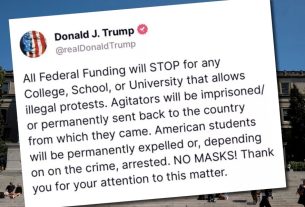((JEWISH REVIEW)) — Authorities in Peru have arrested a 33-year-old man who the FBI has charged with making a string of bomb threats targeting U.S. Jewish institutions, including synagogues on Rosh Hashanah.
Eddie Manuel Nunez Santos made more than 150 threats, mostly by email, against synagogues, hospitals, school districts and other institutions in five states between Sept. 15 and Sept. 21, according to the FBI’s complaint against him, which was unsealed Thursday. Nunez Santos was arrested in Lima on Tuesday, according to the FBI.
The FBI says Nunez Santos, who is Peruvian, embarked on the bomb threat spree after asking teen girls to send him pornographic pictures of themselves and being rejected. He is also being charged with crimes related to those requests, the FBI said.
Some of the emailed threats included phone numbers to contact. Those phone numbers, the FBI said, belonged to the teen girls who had rejected or cut off contact with him.
The tally of threats in the complaint reflect only some of those that have been reported by synagogues or their local police departments in the last few months. None of the threats have been credible.
After Rosh Hashanah, which began on the evening of Sept. 15, the Anti-Defamation League said it had counted a total of 71 threats against Jewish institutions in 14 states since July 21. But the ADL, an antisemitism watchdog, cautioned that the real number may be even higher: Some communities, it said, had chosen not to disclose the threats they received, in part to avoid gratifying whoever was issuing them.
The bomb threats targeting synagogues have, in many cases, led to congregations being evacuated in the middle of prayer services so that police can conduct a sweep of the building. In addition, the threats included in the complaint resulted in thousands of schoolchildren evacuating their schools; a lockdown of a hospital; and flight delays, according to the FBI.
The FBI and antisemitism watchdogs did not immediately respond to questions about whether additional people might have been responsible for the recent wave of bomb threats. The threats in the complaint were made to institutions in New York, Pennsylvania, Connecticut, Arizona, and Alaska, according to the FBI, but evacuations were reported in several other states including several in New Jersey on Rosh Hashanah.
The complaint includes an example of a complaint received by a synagogue in Westchester County, New York, on Sept. 17, the second day of the holiday. “I placed multiple bombs inside the Jewish Center,” the threat said. “The bombs I placed in the building will blow up in a few hours. Many people will lay in a pool of blood.”
At the time, the Westchester Jewish Council’s security committee emailed synagogues in the county saying that local police and the council’s own security official had investigated the email and others received in the area that day and deemed them non-credible. The committee emphasized that all threats needed to be investigated, a warning that came after months of recurring fake threats.
Using data tied to the emails, and by investigating the included phone numbers, law enforcement agents were able to trace the emailed threats to Nunez Santos, who works as a web developer.
The five charges that Nunez Santos faces, if he is convicted, carry the potential of significant prison time. The charges of conveying hoaxes and communicating threats across state lines carry maximum sentences of five years in prison. The charges related to child pornography and exploitation carry much harsher penalties.
“Not only did Santos allegedly email hundreds of hoax bomb threats terrorizing schools, hospitals, and houses of worship, he also perversely tried to sextort innocent teenage girls. His actions wasted limited law enforcement resources, put first responders in unnecessary danger, and victimized children,” the FBI’s assistant director in charge, James Smith, said in a statement. “The FBI will not tolerate anyone who seeks to induce fear in our communities, and we will do whatever it takes to put the perpetrators of such actions behind bars, regardless of their location.”
This is not the first time false bomb threats have been called into a series of Jewish institutions. More than 100 such threats were called into Jewish community centers in the early months of 2017 — most of which, it was later discovered, came from a teen in Israel. In 2020, dozens of JCCs received a separate series of emailed bomb threats.



